

Quantum technology. Quantum technology is a new field of physics and engineering, which transitions some of the stranger features of quantum mechanics, especially quantum entanglement and most recently quantum tunneling, into practical applications such as quantum computing, quantum cryptography, quantum simulation, quantum metrology, quantum sensing, and quantum imaging.
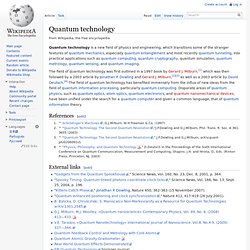
The field of quantum technology was first outlined in a 1997 book by Gerard J. Milburn,[1] which was then followed by a 2003 article by Jonathan P. Dowling and Gerard J. Milburn,[2][3] as well as a 2003 article by David Deutsch.[4] The field of quantum technology has benefited immensely from the influx of new ideas from the field of quantum information processing, particularly quantum computing.
References[edit] Jump up ^ Schrödinger's Machines, G.J.Milburn, W H Freeman & Co. (1997)Jump up ^ "Quantum Technology: The Second Quantum Revolution,"J.P.Dowling and G.J.Milburn, Phil. External links[edit] See also[edit] Biotechnology. "Bioscience" redirects here.
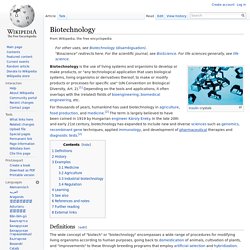
For the scientific journal, see BioScience. For life sciences generally, see life science. Biotechnology is the use of living systems and organisms to develop or make products, or "any technological application that uses biological systems, living organisms or derivatives thereof, to make or modify products or processes for specific use" (UN Convention on Biological Diversity, Art. 2).[1] Depending on the tools and applications, it often overlaps with the (related) fields of bioengineering, biomedical engineering, etc.
For thousands of years, humankind has used biotechnology in agriculture, food production, and medicine.[2] The term is largely believed to have been coined in 1919 by Hungarian engineer Károly Ereky. In the late 20th and early 21st century, biotechnology has expanded to include new and diverse sciences such as genomics, recombinant gene techniques, applied immunology, and development of pharmaceutical therapies and diagnostic tests.[2] Nanotechnology. Nanotechnology ("nanotech") is the manipulation of matter on an atomic, molecular, and supramolecular scale.
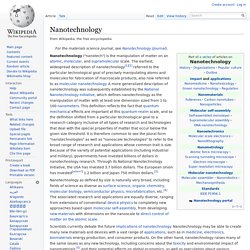
The earliest, widespread description of nanotechnology[1][2] referred to the particular technological goal of precisely manipulating atoms and molecules for fabrication of macroscale products, also now referred to as molecular nanotechnology. A more generalized description of nanotechnology was subsequently established by the National Nanotechnology Initiative, which defines nanotechnology as the manipulation of matter with at least one dimension sized from 1 to 100 nanometers. This definition reflects the fact that quantum mechanical effects are important at this quantum-realm scale, and so the definition shifted from a particular technological goal to a research category inclusive of all types of research and technologies that deal with the special properties of matter that occur below the given size threshold. Origins[edit] Programmable matter. History[edit] In the early 1990s, there was a significant amount of work in reconfigurable modular robotics with a philosophy similar to programmable matter.[2] As semiconductor technology, nanotechnology, and self-replicating machine technology have advanced, the use of the term programmable matter has changed to reflect the fact that it is possible to build an ensemble of elements which can be "programmed" to change their physical properties in reality, not just in simulation.
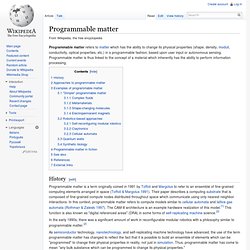
Thus, programmable matter has come to mean "any bulk substance which can be programmed to change its physical properties. " In the summer of 1998, in a discussion on artificial atoms and programmable matter, Wil McCarthy and G. Future Body. Gender alternatives. IAC-08/B3/5/12. Low-Gravity Olympics: How Would Gymnastics Look in a Future Lunar Colony? Iordan Iovtchev at London 2012 Olympics.
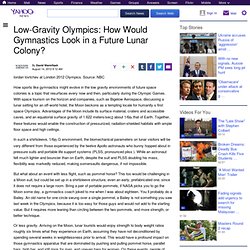
Source: NBC. Future Science. Gravitational Cosmology. Quantum - String Theory. Multiverse. Multiverse_sciam.pdf. The Case for Parallel Universes. Is our universe inside a bubble? First observational test of the 'multiverse' The theory that our universe is contained inside a bubble, and that multiple alternative universes exist inside their own bubbles -- making up the 'multiverse' -- is, for the first time, being tested by physicists.
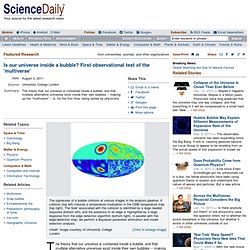
Two research papers published in Physical Review Letters and Physical Review D are the first to detail how to search for signatures of other universes. The Universes of Max Tegmark. A Guide to Different Kinds of Parallel Universes « NOVA's Physics Blog: The Nature of Reality. These days it often seems that if a theory has loose ends, its dangling threads are surreptitiously tied together out of view within the hidden fabric of a parallel universe.
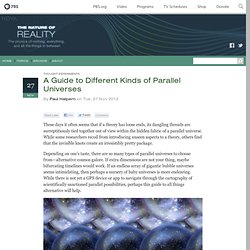
While some researchers recoil from introducing unseen aspects to a theory, others find that the invisible knots create an irresistibly pretty package. What Types of Parallel Universes Are There? - Types of Parallel Universes. Question: What Are the Types of Parallel Universes?
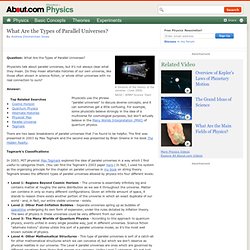
Physicists talk about parallel universes, but it's not always clear what they mean. Do they mean alternate histories of our own universe, like those often shown in science fiction, or whole other universes with no real connection to ours? Answer: Physicists use the phrase "parallel universes" to discuss diverse concepts, and it can sometimes get a little confusing. For example, some physicists believe strongly in the idea of a multiverse for cosmological purposes, but don't actually believe in the Many Worlds Interpretation (MWI) of quantum physics. Dark Matter 2. Dark Universe / Transient Universe | Outer Solar System | Near Earth Objects | Milky Way | LSST Tour Dark Matter | Dark Energy | 3D mass Illustration of strong gravitaional lensing.
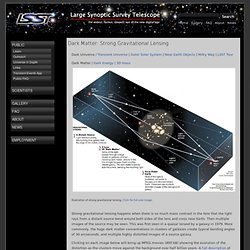
Click for full-size image. Quantum Entanglement. The Complete History of Time Paradoxes. This list just made me want to go back in time and READ MORE SCIFI LIT...there's stuff here I've never even heard about, let alone read.
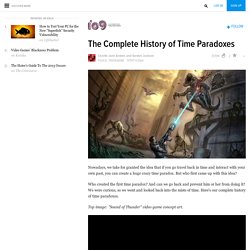
Though, on the whole, I've got to say I find it more interesting from a storytelling and potential character development standpoint when characters from the past somehow wind up in the future, rather than the other way around. OH, and A Sound of Thunder video game has the potential to be really really awesome, so please, developers, don't F*** it up! I'm literally salivating over the idea of battling my way through future-Chicago. More concept art please!! Flagged. Universe Timeline. Future Social Science. Social Science Research Network (SSRN) Home Page.
2011 World Clock. POODWADDLE WORLD CLOCKThe World Stats Counter (V 7.0) Labs : Research: Social Computing Lab. Social Computing Research focuses on methods for harvesting the collective intelligence of groups of people in order to realize greater value from the interaction between users and information. Our research includes collective intelligence (“wisdom of the crowd”), incentive design for accessing resources, social networks and their implications for information dissemination and collective attention.
We are creating new information services that dynamically respond to fluid content creation and consumption. Social Computing Research is the birthplace of HP ePrint and HP Gloe. Érudit. Future Economics. Galactic Engineering.
Planetary Engineering. Terraforming. An artist's conception shows a terraformed Mars in four stages of development. Terraforming (literally, "Earth-shaping") of a planet, moon, or other body is the theoretical process of deliberately modifying its atmosphere, temperature, surface topography or ecology to be similar to the biosphere of Earth to make it habitable by Earth-like life. The term "terraforming" is sometimes used more generally as a synonym for planetary engineering, although some consider this more general usage an error. [citation needed] The concept of terraforming developed from both science fiction and actual science.
The term was coined by Jack Williamson in a science-fiction story (Collision Orbit) published during 1942 in Astounding Science Fiction,[1] but the concept may pre-date this work. History of scholarly study[edit] In March 1979, NASA engineer and author James Oberg organized the First Terraforming Colloquium, a special session at the Lunar and Planetary Science Conference in Houston. Mars[edit]
Galactic Ecology. Noogenesis. Noogenesis (Ancient Greek: νοῦς=mind + γένεσις=becoming) is the emergence of intelligent forms of life. The term was first used by Pierre Teilhard de Chardin in regard to the evolution of humans. It also used in astrobiology in regard to the emergence of forms of life capable of technology and so interstellar communication and travel. Teilhard[edit] Noosphere. Extraterrestrial Life. The official U.S. government position on extraterrestrial life and the three major efforts to search for it. Clockwise from top left: Fermi paradox. Great Filter. The idea was first proposed in an online essay titled, "The Great Filter - Are We Almost Past It?
" written by economist Robin Hanson. The first version was written in August 1996 and the article was last updated on September 15, 1998. Kardashev scale. Drake equation. The Planetary Society. Planetary Habitability Laboratory @ UPR Arecibo. Space Colonization. Gaia hypothesis. The study of planetary habitability is partly based upon extrapolation from knowledge of the Earth's conditions, as the Earth is the only planet currently known to harbour life. Ecology.
About Future History. Existing Future Histories. The 8 Most Common Sci-Fi Visions of the Future (And Why They'll Never Happen) How would robotic prostitutes change the sex tourism industry? Science Fiction Future Histories. Classic Fantasy and Science Fiction. The Wrong Way to Plan for the Future. Interesting stuff. The Future of Graveyards. Welcome to the Orion's Arm Universe Project.